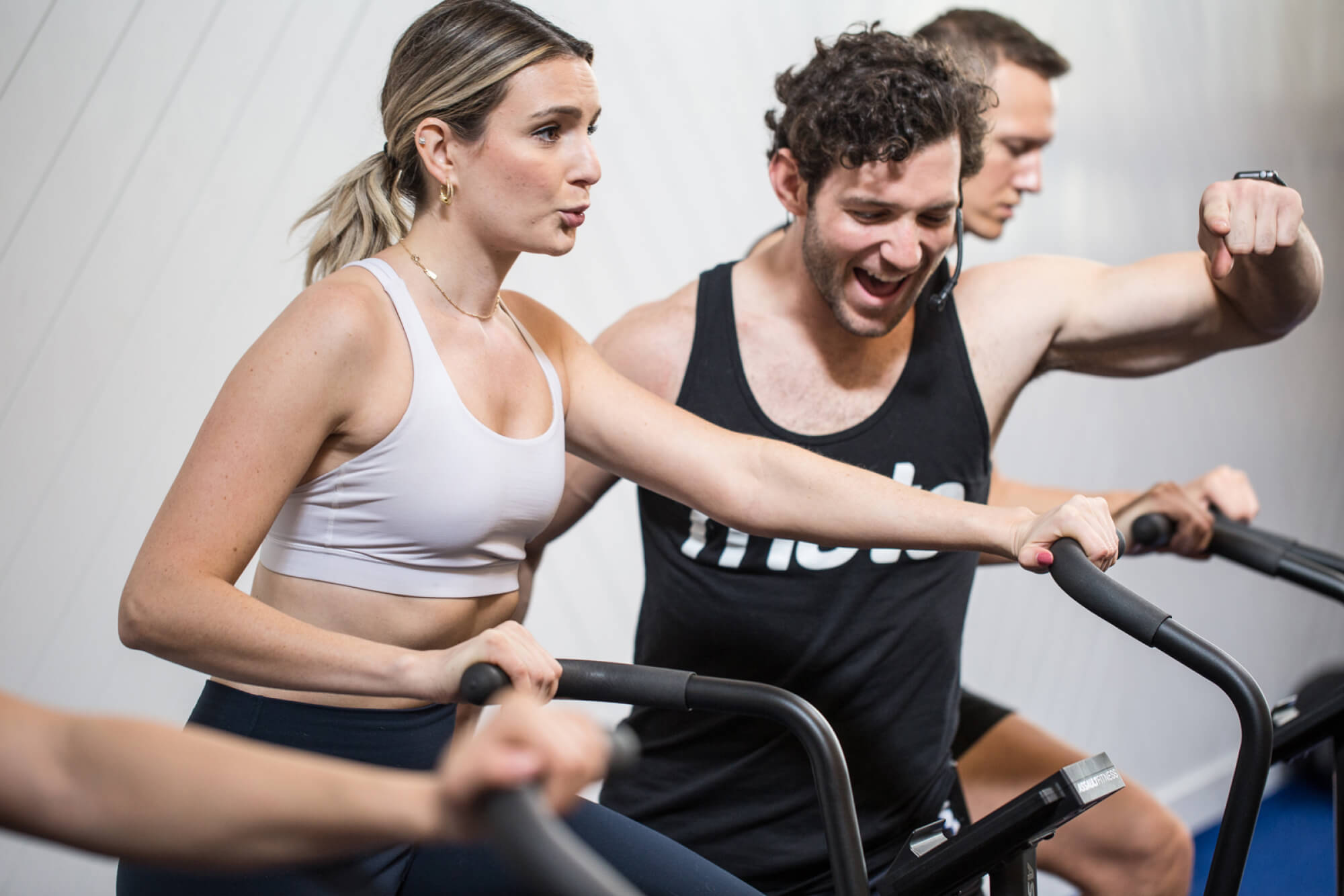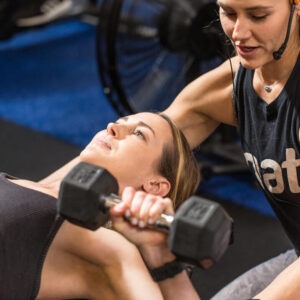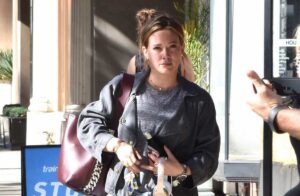In Ryan Murphy’s new Netflix series Hollywood, David Corenswet’s character, Jack Costello, doesn’t start out with much other than his own ambition. He’s a post-WWII veteran living in Los Angeles, and looking for any path to a career working in movies, as unlikely as it may seem at times; he’s having trouble even getting work as an extra. As the series goes on, though, and Jack finds his way into a gas station sex ring and a major movie production, he ends up with a lot more.
While the show features a number of characters who were real-life figures (Rock Hudson, Henry Willson, and Anna May Wong are just a few of the names viewers will become familiar with), Corenswet’s Jack Castello is not one of them. Rather, the show treats him as something of the ‘wide-eyed kid seeking fame’ archetype. Corenswet says that Murphy never told him his character was based on anyone in particular, but that he was hoping Jack would be a tough, cool guy like a Marlon Brando or Montgomery Clift; instead, he ended up being the sort of “Jimmy Stewart” everyman.
“Really good people who were reliable and got into trouble, but not on purpose, and never really wanted to cause anybody any trouble,” he says of his character. “As fun as it is to be cool, I was able to have my moments where I got to pretend to be cool, considering that I am not very cool myself.”
Throughout the show, Jack becomes close with director Raymond Ainsley (Darren Criss) and screenwriter Archie Coleman (Jeremy Pope), having met the latter through the aforementioned gas station sex ring. With these characters growing close on screen, it was only appropriate for them to attempt to do so offscreen, too. One easy way to do that was by hitting up workout classes together in the rare moments when the trio wasn’t filming.
Criss, who most recently won a Emmy for appearing in Murphy’s American Crime Story: Versace, came up with the idea for the trio to kill two birds with one stone, by attending Training Mate classes in West Hollywood. “It’s like an Australian high intensity interval training class where this awesome Australian dude just yells at you the whole time, but yells really encouraging things,” Corenswet says over the phone. “It’s definitely my style of workout class. I’d much prefer to be encouraged than sort of divided or shamed into performance.”
His earnest tone and positivity sounds natural—he does play the most wholehearted character in a show making a point of looking at the underbelly of a glamorous industry, after all. Hollywood isn’t Corenswet’s first role—it’s not even his first Ryan Murphy role, having been a part of the main cast of last fall’s The Politician, also on Netflix—but it’s certainly his biggest yet. And if anything is clear from watching Hollywood, it’s that its leading actor certainly has a future there. The show has a lot happening at pretty much all times, but one of the most consistent things is how the positive energy of Jack Castello never relents. Like his character, it’s clear when watching Corenswet that you’re looking at someone with the on-screen charisma of a future star.
At the end of one particularly busy and chaotic week of filming, a scene was added where Jack and Hudson (Jake Picking)—competing for the same role—are seen working out in a distinctly old-timey fashion. Like everything else in Hollywood, the equipment and machines were straight out of the ’40s—meaning they was very susceptible to being misused and, ultimately, broken. As a result, neither Corenswet nor Picking were allowed to even touch the equipment (except when the cameras were rolling).
One pivotal thing to nail in the workout scene came down to a wardrobe choice. “The most important research I think was just how short the shorts were,” Corenswet said. “You’ve really got to get that right because you go too short and it’s just weird, and you go too long and it looks too modern.”
For a scene thrown in last-minute, it does a good job of showing the different ways in which actors might be expected to work out and beef up for a role; where today the requirement might literally need someone to transform into a superhero, back in the ’40s being able to put together a good set of push-ups did the trick. “The nice thing about the 1940s is that there wasn’t quite as much of the Adonis ideal in pop culture,” Corenswet says. “I mean, it still existed, but I think most of the actors of the time were of a more reasonable BMI—just fit, healthy, and did basic calisthenics, I guess. But there wasn’t quite the same pressure to weigh 250 pounds and be able to lift a small car.”
It’s probably a good thing he got that basic work in, though; with his character’s role in the Golden Tip Gasoline Station sex ring (based on the real-life operation made famous by Scotty Bowers), Corenswet frequently finds himself in exactly the situations you’re probably imagining. Without shirts; without pants; in one later moment, without, well, much of anything.
“This was probably the most undressed that I had been on camera,” he says. The 26-year-old had already read Scotty Bowers’ book, Full Service: My Adventures in Hollywood and the Secret Sex Live of the Stars, a few months prior to filming in preparation for a different project. But for this role, he opted to bring little to none of what he gleaned from the book. His character is supposed to be an earnest, naive newcomer to this strange world, and he wanted his portrayal to reflect that as much as possible.
Instead, Corenswet chose to learn about the stories in real-time, taking much from what his co-stars had researched in their preparation. Dylan McDermott, who plays an older version of a Scotty Bowers-inspired character named Ernie, and Jeremy Pope, whose character was already involved in sex work before meeting Jack, provided knowledge along the way.
Having shot the show at Sunset Gower Studios—where the sound stages are almost entirely from that era—helped to make that jump back to the ’40s feel more real. But even with the show filming between September 2019 and January 2020, did it feel like they were somehow living in the mid ’40s? Not quite. While what we see on screen is transporting, that’s only ever half of what was actually on set. Everything behind the camera, obviously, is modern; people in sweatpants, on their iPhones, and pointing expensive camera equipment in the faces of every actor on screen.
And as a bonus, whenever anyone walked from their trailer to the soundstage, the main avenue provided a bright, sunny (or, at night, well-lit) view of a certain sign that says HOLLYWOOD. “Just going to work sort of felt like you were stepping back in time,” Corenswet says.
In fact, stepping back in time is something that Corenswet felt particularly adept—and excited—to do. Having grown up outside Philadelphia as a fan of movies about movies like Singin’ In The Rain, and others of the age starring Fred Astaire, Ginger Rogers, and Gene Kelly, he says that some of that spirit is already in his default mode. So for the duration of Hollywood, he decided to keep the switch turned on full-time, and live in his whole life 1940s-style. “I was so excited to get to just turn that up to 11 and live in that all the time,” he says. “I didn’t even try to switch it off.
I just decided I was going to be that way all the time.” Luckily, since his character generally tends to come from that earnest, not-so-dark place (unlike the characters of some of his co-stars, like Jim Parsons’ portrayal of real-life agent Willson), it didn’t much of a negative impact. “I don’t think it did anything except probably make me look silly in some social situations,” he said. “I don’t mind that—I generally tend to look silly in social situations anyway.”
What Hollywood ultimately winds up being about, ultimately, is a “What if?” imagining of a different, more inclusive movie industry from what was essentially the get-go. What if it didn’t take until 2018 for a black writer to win a screenwriting Oscar (Jordan Peele for Get Out). What if making a great movie when casting a lead actress of color led to appropriate acclaim and awards? What if actors, filmmakers, and executives alike were never afraid to show the world who they really were behind closed doors? These are the questions that Hollywood looks to answer throughout the seven episodes in its first season.
Corenswet looks at the show as something that runs with the idea of “possibility and playfulness.” As a showrunner extraordinaire, Murphy has already played with the canvas of real people. In his American Crime Story series, he largely tends to stick with reality. But with Hollywood, Corenswet notes, he’s not afraid to play with history a little bit. It’s not quite the serial killer Richard Ramirez gaining demonic powers in the latest season of American Horror Story, but some might see it as similarly far-fetched. “[Murphy] already has such a playfully twisted mind where he’ll think of the thing that nobody else thinks of,” Corenswet says. “To see him do that with real people, real characters, he’s done it before. It’s especially fun for him to do it with this time period and these people.” With the world-building that Hollywood does, and with a system and people and players that so many are already familiar with, it doesn’t take much to set up.
Jack Castello might not be a real person, but if you’ve ever seen an old movie you know exactly the type of guy he’s supposed to be. If you Google “Henry Willson” or “Rock Hudson,” you’ll find results for days and days. The payoff isn’t so much looking at what did happen—it’s easy to find that answer. This show wants to look, instead, at what could’ve happened. “You’re not supposed to just lie about people, but that’s what the great thing about stories is,” Corenswet says. “We all agree that it’s not true, but if there’s some value in imagining what if it were true or what if it were different or if whatever didn’t play out.” And in a way, it makes the cheery and uplifting mood behind Hollywood a little tragic.
Seeing things happen the way we wish they would’ve on screen in a fictional series, in a way, just reminds us of how that’s a correction. Those things didn’t happen. And it continues to bring the idea around and around in a circle. These things’s didn’t happen—but what if they did?
Source: https://www.menshealth.com/entertainment/a32321006/david-corenswet-interview-hollywood-netflix/




